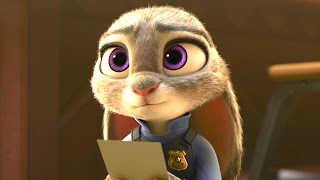Disney’s latest film, Zootopia, has a lot going for it. The production design, computer animation, and voice work are first rate. The whole movie is zippy, funny, and lovely to look at. In addition to all of that, Zootopia is also a meaningful statement about racism and prejudice as well as a smart, knowing take on a familiar film genre, the police procedural.
Zootopia takes
place in a world of anthropomorphic animals who have evolved past their more
primal ways. They wear pants and go to work and, importantly, don’t eat each
other. In this world, we meet Judy Hopps, a petite rabbit from a small carrot-farming
community whose strong sense of justice leads her to want to be a police
officer. This is ridiculous, of course, because she’s a rabbit and everybody
knows that rabbits just aren’t born with the physical or mental abilities
required in police work. Judy pushes past her parents’ doubts and society’s low
expectations and graduates first in her class at the academy. Arriving for her
first assignment in the big city of Zootopia, she finds that her determination
to break boundaries and her enthusiasm for police work aren’t shared by many
colleagues. She is both casually and purposefully discriminated against because
of her species. Even her kindest colleague refers to her as “so cute.” Judy is
relegated to parking meter duty which is where she meets Nick Wild, a fox con
artist who makes a killing with an elaborate scheme for selling contraband
popsicles to the same group of lemmings every day. (It sounds ridiculous, but
is actually ingenious and funny.)
Judy and Nick end up working together as she tries to solve
the case of a missing otter which, naturally turns into a much bigger case
involving dozens of missing animals, citizens of Zootopia going wild and
returning to their more animalistic ways, and a conspiracy that reaches all the
way to the mayor’s office. Judy’s first-rate detective work and Nick’s clever
street smarts complement one another in true mismatched buddy movie fashion.
What’s most interesting is how the film uses funny talking
animals to deal directly with racism and prejudice. In the film, racism becomes
the division between predators and prey but there is also the issue of casual
stereotyping of individuals because of their species. It also punctures race
and class privilege and shows that even well-meaning characters can be
unintentionally prejudicial. Given the times we live in and the length of time
it takes to produce a movie like Zootopia, the film is surprisingly prescient.
There’s even a scene after a predator attack in which reporters mob Judy and
ask if she thinks there should be a ban on all predators from the city. The
film wisely points out that we are at our best when we look at and interact
with individuals rather than making broad, uniformed, fear-driven assumptions
about entire groups.
The other wonderful aspect of Zootopia is how well it knows and plays with the conventions of the
policier, the police procedural movie. So many of the well-known components of
cop movies are here – the ambitious academy recruit, the gruff commander,
sneaky snitches, red herring villains, conspiracy and corruption within the
ranks – but the film adds new insights to these seemingly tired conventions
through clever character design, sharp writing, and the metaphor of animals as
stand-ins for people. In many ways, it’s a familiar story, but Zootopia brings new light.
Ginnfer Goodwin of TV’s Once
Upon a Time is a stand-out as the voice of Judy Hops and brings real
emotion to what could be just an easy paycheck part. Idris Elba continues to be
awesome as the cape buffalo police chief Bogo and even the usually limited
Jason Bateman brings a new quality to his performance as Nick Wilde. Zootopia is good on just about every
level a movie can be good. You should see it.



No comments:
Post a Comment